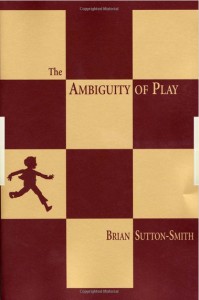Promised Eveline to be on the lookout for play stuff - moments of free-form play…
Sutton-Smith: The Ambiguity of Play
 Play is a notoriously difficult concept to define. Anthropologist Brian Sutton-Smith had a go at it in 1997 when he published ‘The Ambiguity of Play’.
Play is a notoriously difficult concept to define. Anthropologist Brian Sutton-Smith had a go at it in 1997 when he published ‘The Ambiguity of Play’.
I found a good summary of his book on the ‘net, from which I quote now:
“Anthropologist Brian Sutton-Smith, a leader in twentieth-century research in play, and one of the core play theorists used in this book, has defined play consisttently through the years as an activity that is fun, voluntary, intrinsically motivated, incorporates free choices/free will, offers escape, and is fundamentally exiting. He has argued that play activities can be grouped in four categories: play as learning, play as power, play as fantasy, and play as self. While quick to recognize the dark side of play, including bullying, abusive situations, and frightening circumstances, Sutton-Smith also notes that play can be defined as a variety of activities; as exchanges of power, or “power plays” that prioritize competition and traditionally aggressive play styles; as the act of bonding and belonging; as a practice of real-life functions; and as “fun”, being with friends, and choosing freely. Play is recognized as one of the most fundamental aspects of the human condition. While play spaces are generally fantasy spaces, players often experience real stakes when inside them. One might easily find examples of the “serious” aspects of play in sport and gambling. ”
Sutton-Smith apparently calls Huizinga and Caillois ‘the idealizers’ – because they do not deal with the darker sides of play. Interesting! More to come here when I have read the book.
| « Caillois: Man, Play and Games | <-- previous post | next post --> | Create yourself » |
|---|







